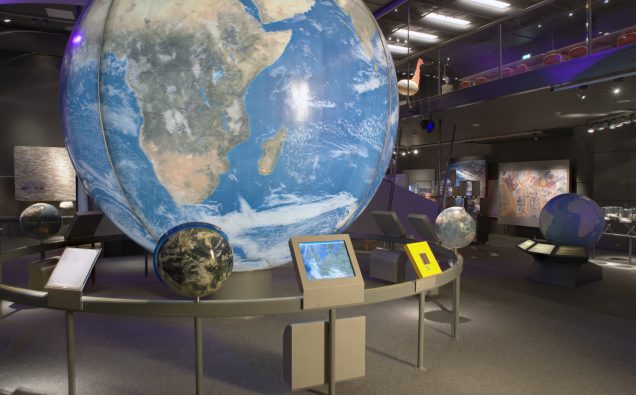
Photo by Henk Caspers, Naturalis Biodiversity Center showing Africa on a huge globe via Wikimedia Commons
As thought leaders, economists and politicians gather for discussions in Davos, Switzerland, the World Economic Forum has released its Global Risks Report 2017 – providing an opportunity to demystify some of the major issues facing humanity and exploring possible approaches to their resolutions.
The Forum takes place at a time of both geopolitical uncertainty and tremendous development promise that seems within reach in the wake of recent information technology and scientific advances.
In fact, the last few years have thrown up a mix of challenges and opportunities with stark choices that appear to defy all forms of traditional diplomatic approaches for world peace and development and demand a new combination of pragmatism and coordination for the sake of interlinked peace and security.
The exponential spread of the Internet usage, cutting-edge innovation, rise and in many cases the hold of artificial intelligence over current trends and the future prospects of societies, uncontrolled conflicts in the Middle East, Africa and tensions between and among major powers including the United States, Russia and China, almost endless tensions between South Asian neighbors India and Pakistan and countries in South China Sea regions, lingering conflicts like Israeli-Palestinian dispute, economic uncertainties, new alliances even South China Sea, economic and digital inequalities, assertive role of countries – previously considered marginal and almost inconsequential to global scheme of things – climate change, fights for depleting natural resources, appearance of new jobs and disappearance of traditional opportunities, rise of authoritarian populism in the West, worsening lack of democracy in the Muslim countries, world’s inability to stem violent extremism and international crimes, and the need to satisfy the new generation of tech-savvy millennials, all seem have taken an unprepared world by storm – suddenly and simultaneously.
The choice may boil down to exclusiveness or inclusiveness. But the old style protectionism and unbridled globalism have also left huge parts of humanity disaffected. The one thing that seems certain is interdependence and interconnectedness of people far and near in terms of both challenges and opportunities. Broadly speaking, the challenge appears to be overcoming trust deficit in way that helps find mutually acceptable and viable solutions to troubles afflicting the world.
While analysts and experts are trying to decipher some of the complexities related to economic, developmental, climatic and sociopolitical trends from a variety of perspectives, it is for the world leaders embrace prescriptions for peace beyond war.
In the 12th edition of the WEF report, compilers identify five factors that aggravate the impact on global risks of the current geopolitical atmosphere of “rising competition, loss of trust and heightened suspicion.”
Here is how authors of the report look at the factors impacting the world, and provide some food for thought:
“First, international cooperation is giving way to unilateral or transactional approaches to foreign policy just as a host of issues –such as global growth, debt and climate change – demand urgent collective action. If allowed to fester, such issues could spawn a range of new problems with costs falling disproportionately on fragile communities.
Second, the inter-connected nature of the global system produces cascading risks at the domestic level.
In Syria, for example,failures of governance have produced civil conflict, driving migration that transfers economic, social and political pressures into countries already experiencing frustrations with low growth and rising inequality, fuelling radicalization and acts of violence.
Third, a declining sense of trust and mutual good faith in international relations makes it harder to contain the resulting pressures through domestic policy. The current climate of mutual suspicion can exacerbate domestic political tensions through accusations of outside actors interfering to shape popular perceptions via proxy forces, media manipulation or threatening military gestures.
Fourth, technological innovation exacerbates the risk of conflict. A new arms race is developing in weaponized robotics and artificial intelligence.
Cyberspace is now a domain of conflict, and the Arctic and deep oceans are being opened up by remote vehicle access; in each case, there is no established system for policing responsible behavior.
Because research and development of “dual-use” technologies takes place largely in the private sector, they can be weaponized by a wider range of state and non-state actors – for example, the self-proclaimed “Islamic State” has used commercial drones to deliver bombs in Syria, and open-source technology could potentially create devastating biological weapons. Existing counter-proliferation methods and institutions cannot prevent the dissemination of technologies that exist in digital form.
Fifth, while risks intersect and technologies develop quickly, too often our institutions for governing international security remain reactive and slow-moving.”













